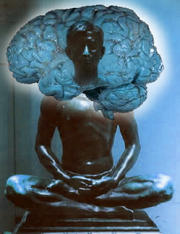My good Stoic sparring partner on the
International Stoic Forum, Rick, has recently done me the honor of reading my article on
Natural-Objective Ethics. Below is my response to his thoughts. If you'd like to read his original thoughts, they can be read by
clicking here.
Actually, I pretty much agree with what you say, generally. But a big part of why I agree is, as you point out yourself a few times in the work, is that you are not proposing anything substantially different than what already exists. It seems your goal is to 'objectify' existing ethical trends, not try to reinvent the proverbial wheel.
True. I think what I'm trying to do is call attention to what it is we are really doing in our ethical deliberations, so that we might do it more proficiently and with more focus.
When I use "Objective" I mean things that external to, and independent of, sentient minds (for our purposes, human minds). Things like matter and energy, physical objects, the physical laws of the universe, etc. When I use "Subjective" I mean ideas, ideologies, notions, thoughts, beliefs, etc., that are products of the human mind.
That's reasonable. I would tend to agree with this.
But what is your thought about the Pythagorean Theorem (the length of the hypotenuse squared is equal to the sum of the squares of the other two sides) - is that objectively true?
If not, then do you think that other intelligent extra terrestrials somewhere could invent/discover it? It seems to me that if they can, then it must be a fact that is discovered rather than invented - something that exists and is true apart from our knowledge of it.
If it IS objective, then where does it exist? What atoms, "matter, or energy" is it made out of?
I think our definition of "objective" needs to include certain data about dispositions and inter-relations OF matter in the universe.
Now... Here is a question: Is Mr. Spock from Star Trek objective or subjective? It's a bit tricky.
Yes, but I think the 'trickiness' comes from an imprecise definition of "Mr. Spock". If, by that label, you mean an organism of a non-human (actually half human) species, from the planet Vulcan, then Mr. Spock is not objective and does not exist (don't say that at a star trek convention surrounded by people in uniforms).
But if, by the label "Mr. Spock" you mean a bit of data (a "meme") which is a description of a character, then not only does Mr. Spock exist, but it is fully objective - every bit as much as we can say that Windows software (a collection of data) objectively exists. Furthermore, the "Mr. Spock" meme, like Windows, is continuously replicated in multiple formats and mediums, and spread across the planet, having real effects.
I think your take on the objective/subjective issue is too heavily focused on what's inside and what's outside our skulls. What might make it more clear, in my view, is to set that issue aside for a moment and recall that 'everything is atoms' (or particles, strings, whatever).
When it's all said and done - it's all a bunch of particles bouncing around, and everything we think, see, do, describe, philosophize about, and so on ALL boils down to that simple fact. These are all descriptions of one set or subset of interactions of particles in this gigantic universal soup.
(I think, being in the company of Stoics, who are materialists, I can say this without ducking my head!)
Now, that includes brains and it includes the activity of brains. And, just as much as data on a computer disk, it includes thoughts, memories, emotions, etc. These are all names we give to certain arrangements and activities of sets of particles.
The key, like our defining of what we mean by "Mr. Spock" is in defining what we mean by terms.
When I say that ethics is objective, the earlier portions in which I define exactly what is meant by "ethics" is absolutely essential to making that statement meaningful and true. If even a slightly different notion of the word is substituted, then the sentence "ethics is objective" may not mean the same thing, and may not even be something I agree with.
But, if we are to approach anything rationally, I think a precise definition is important. I also give my reasons WHY I have defined 'ethics' as I have, and this would be another matter to debate in its own right.
So, ethics are like the Pythagorean theorem. They are objective because they describe something that is true and objective about the interaction of Homo Sapiens individuals and their effects. Furthermore, similar species on other worlds (if they are similar in their natures) could discover (not invent) true ethics themselves, and this overlap would illustrate the objective nature of these "rules of efficient interaction".
Now, with "Mr. Spock" (the meme), it is not the case that other worlds would "discover" this concept independently (apart from amazing coincidence). This meme/bit of data doesn't refer to anything objectively true in the universe. Many of the principles embodied WITHIN the character may, however, and these are generally principles of rationality and ethics. For example, aliens might generate a fictional character that believed "the needs of the many outweigh the needs of the few".
Anyway, I think a similar type of ambiguity creeps into ethics. As you astutely pointed out in your work, ethics come from humans and cannot exist without humans.
True, but the Pythagorean Theorem cannot exist without triangles, to which it references. The fact is that humans objectively exist, and they exist in this universe. So, because of this, human ethics, which describes very real and objective things about how humans can most efficiently interact, is also objective.
Let me look again at space aliens, but this time a hypothetical example of one with vastly different instinctive responses, biological life cycles, and so on. Let's call them the "bleebs". The bleebs would have their own set of ethics, which define the set of moral norms that, if accepted, would generate the greatest level of survival and prosperity for that species. Now, maybe because of bleeb anatomy or psychology, one of these sub-ethics might be eating your children at some point. For the bleebs, this would be ethical, and it would be objectively so. Because the bleebs WOULD exist, and bleeb ethics would be as true as rules about how to build the strongest bridge or the fastest sail boat.
For those species capable of consciously molding their own behavior to learned norms (not just acting off immediate instinct) ethics *IS* tied to that species. But this doesn't render it subjective because the species isn't subjective. They are made out of matter and interact in certain ways. Therefore, the most "ideal" set of procedures for them to interact is *literally* a matter of engineering.
...But I do not believe that ethics are some 'force' in the universe that exists independent of the human mind and will, such as in gravity.
Consider that, if you ignore gravity, you will fall. In addition, if you ignore ethics, there will be an objective effect and you will similarly bring harm to yourself. It's just that the effect is much more complicated because of the intricate web of interactions among so many people and factors.
So, while I wouldn't call ethics a "force", I would say that it defines something as true and as objective as the formulas describing gravity and the Pythagorean Theorem.
 I have recently been reading about Buddhism and the concept of mindfulness. The author mentions always being aware of all of the stimuli around you (breathing, footsteps, etc) and all of the little things we normally do on "autopilot".
I have recently been reading about Buddhism and the concept of mindfulness. The author mentions always being aware of all of the stimuli around you (breathing, footsteps, etc) and all of the little things we normally do on "autopilot".





